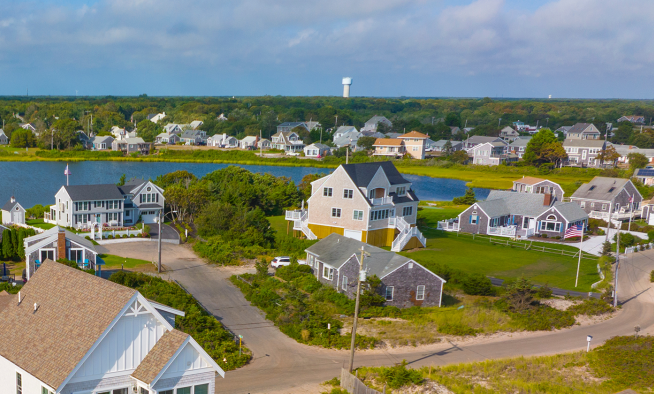Zoning for Housing
Suite of model bylaws designed to encourage greater housing options
The Regional Housing Strategy is a plan that aims to address the region’s housing challenges by providing a set of tools to help Cape communities expand housing opportunities for those who need and want to live here.
The tools include a suite of model bylaws the Cape Cod Commission has developed working with Utile and Outwith Studio. Towns can customize and adopt these bylaws to help encourage and incentivize development and redevelopment of housing that meets the needs of the region.
Design-driven housing
This model bylaw allows an array of context-sensitive multifamily housing uses by-right with specific parameters for building form. The bylaw is designed to encourage diverse, financially attainable housing options that align with a Town’s vision. It can foster or enhance compact, pedestrian-oriented villages that include a mix of residences and businesses, encouraging the preservation and reuse of existing buildings.
Zoning for seasonal worker dormitories
Housing for seasonal workers is scarce, with many businesses struggling to hire seasonal workers because they cannot find a place to live, resulting in inadequate staffing during the Cape Cod’s busy summer season. This model bylaw is designed to encourage the provision of safe living spaces dedicated to the seasonal workforce. The model bylaw provides for dormitories within a mixed-use setting, as an accessory to new or existing commercial buildings, or in lower density areas and locations along commercial corridors.
Converting single-family homes to multi-family housing
Current zoning often prohibits conversion of single-family homes into multiple units, especially by-right. This model bylaw encourages conversions, aiming to broaden the range of available housing options, provide an alternative use for large historic homes, limit construction-related greenhouse gas emissions, and respect the aesthetic value of Cape Cod’s existing housing.
Incentivizing year-round rentals
Cape Cod’s year-round rental market is facing significant pressure from the seasonal, second home, and short-term-rental market. The lack of available, attainable year-round rentals has destabilized communities, hampered economic development and increased the cost of housing and other goods and services. This model bylaw offers an incentive to encourage a portion of a development to be used as year-round rental units to foster production of housing occupied by long-term residents who may want or need to rent rather than purchase their home.
All of these model bylaws can be customized to best suit a community’s unique character, needs, and priorities. They can also help advance initiatives to encourage greater housing diversity in the region.
To learn more, please visit capecodcommission.org/our-work/rhs-model-bylaws.
Related Posts




